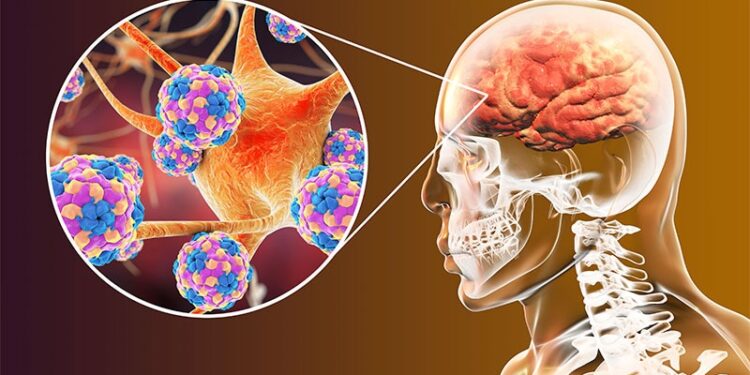TOPLINE:
Psychiatric comorbidities were the strongest independent predictors of unfavourable outcomes in autoimmune encephalitis (AE); however, severe infections reflected acute disease severity rather than comorbidity burden.
METHODOLOGY:
- This multicentre, retrospective analysis included 308 adults with definite antibody-positive AE from the GErman NEtwork for REsearch on AuToimmune Encephalitis registry (June 2004 to July 2023).
- Patients had definite AE with anti-N-methyl-D-aspartate receptor (n = 144), anti-leucine-rich glioma-inactivated 1 (n = 98), anti-contactin-associated protein-like 2 (n = 47), and anti-immunoglobulin-like cell adhesion molecule 5 (n = 19) antibodies, with at least 12 months of follow-up.
- Preexisting conditions (PECs) and secondary diagnoses documented during hospitalisation were categorised on the basis of the organ system; the severity of infectious complications was graded using the Common Terminology Criteria for Adverse Events v5.0.
- The primary outcome was functional status, assessed using a modified Rankin scale (mRS) at a minimum of 12 months post-admission, with unfavourable outcome defined as a mRS score > 2.
TAKEAWAY:
- The presence of three or more PECs increased the risk for unfavourable long-term functional outcomes (odds ratio [OR], 2.80; 95% CI, 1.57-4.92; P < .001).
- Psychiatric comorbidities had the strongest association with unfavourable outcomes (OR, 4.55; 95% CI, 1.99-10.60; P < .001).
- Cardiovascular PECs (OR, 1.93; 95% CI, 1.09-3.30; P = .03) and higher disease severity at peak (mRS score > 2; OR, 3.01; 95% CI, 1.36-7.20; P = .01) were linked to unfavourable outcomes.
- A total of 13.6% of patients experienced severe infections during hospitalisation, which were not significantly associated with unfavourable outcomes in the univariable analysis (OR, 1.94; 95% CI, 0.97-3.89; P = .10).
IN PRACTICE:
“As premorbid psychiatric conditions are main factors associated with unfavorable outcomes, these patients would highly benefit from integrated interdisciplinary treatment centers, or at least heightened awareness of these factors,” the authors wrote.
SOURCE:
This study, led by Amelie Bohn, Department of Neurology, RWTH Aachen University, Aachen, Germany, was published online on July 07, 2025, in Neurology: Neuroimmunology & Neuroinflammation.
LIMITATIONS:
This study’s retrospective, multicentre design introduced potential selection and information biases. The reliance on electronic health records and overlapping definitions of comorbidities may have resulted in underrepresentation or overrepresentation of certain conditions. Additionally, varying follow-up durations and the use of the mRS as an outcome measure may not have fully captured cognitive or emotional dysfunction.
DISCLOSURES:
This research was supported by the Clinician Scientist Program of the Faculty of Medicine RWTH Aachen University and partially supported by grants from the German Federal Ministry of Education and Research. Few authors reported receiving travel and speaker honoraria from various sources, including Merck and Roche, and one author reported supporting neuroimmunologic studies for several pharmaceutical companies.
This article was created using several editorial tools, including AI, as part of the process. Human editors reviewed this content before publication.
Source link : https://www.medscape.com/viewarticle/psychiatric-issues-worsen-autoimmune-encephalitis-outcomes-2025a1000ikw?src=rss
Author :
Publish date : 2025-07-16 12:00:00
Copyright for syndicated content belongs to the linked Source.











